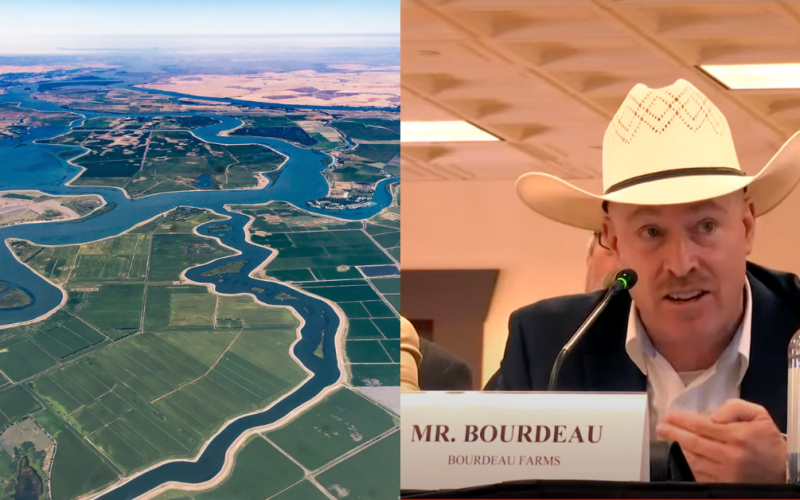The following is testimony that was provided during the House Natural Resources Committee’s Field Hearing in Santa Nella, Calif. by the author.
Good morning, Chairman and distinguished members of the subcommittee.
My name is William Bourdeau. I am a farmer on the Westside of the San Joaquin Valley, a United States Marine Corps veteran, a Water District Director, a former Coalinga City Council member, and concerned citizen. I am here today to address the critical challenges posed by current water management practices, not just on California farmers, but on the broader community and nation.
This issue transcends agriculture—it affects families, public health, and the American dream.
Agriculture is more than just an industry in the San Joaquin Valley; it is the lifeblood of our communities, providing jobs, supporting local businesses, and sustaining families.
The Bureau of Reclamation’s delays and overly conservative approach to water allocations this year have had far-reaching and devastating consequences. Despite historic rainfall and snowpack the Bureau’s allocation announcements failed to account for this abundance, issuing a minimal allocation that did not reflect the actual conditions. By the time a modest increase was announced, it was too late for growers to adjust their plans for the year.
These delays impact not just farmers, but the entire agricultural supply chain, including buyers and processors who need reliable water supply forecasts to secure their operations.
For example, garlic packers plant from September to October for harvest the following year, and tomato processors finalize commitments by January for the upcoming summer. When water announcements are delayed until March or later, these stakeholders cannot adjust, resulting in lost contracts, idle equipment, and job losses. The ripple effect extends throughout our communities, threatening the stability of local economies that depend on agriculture.
The impact of inadequate water supply extends far beyond the fields—it hits our communities at their core. As farms struggle, local economies suffer. The reduction in agricultural activity means fewer jobs and less income circulating in the community, which directly affects local businesses, schools, and public services. We are seeing increased respiratory illnesses due to poor air quality, exacerbated by dust from fallowed fields and the lack of healthy crops that would otherwise help clean the air. This places additional strain on already overburdened healthcare facilities, stretching community resources to their limits.
As public safety budgets shrink and essential community services are cut, the social fabric of our communities begins to fray. Families who work the land face financial uncertainty, leading to stress, deteriorating mental health, and a loss of hope. This collapse of community is not just an economic issue—it’s a human crisis. The erosion of the American dream is felt most acutely by those who have worked hard to achieve it, only to see it slipping away due to factors beyond their control.
The scarcity of water caused by mismanagement is not just a problem for farmers—it’s a problem for everyone. When farms cannot produce at full capacity, the supply of domestically grown food decreases, leading to higher food prices for all Americans. This man-made water scarcity artificially inflates the cost of basic food items, disproportionately affecting low-income families and the most vulnerable members of our society. It forces consumers to pay more at the grocery store, compounding financial stress on households already struggling with inflation and economic uncertainty.
Moreover, the increased dependence on imported food due to reduced domestic production is not only a threat to our national security but also undermines our self-sufficiency. It makes us vulnerable to global supply chain disruptions and external market forces, further driving up prices and decreasing the availability of fresh, nutritious food for American families.
The reality is that we have the potential for water abundance. Proper management and transparent, timely water allocations could provide ample supply to support our agricultural needs and sustain our communities. The Bureau of Reclamation must be held accountable for ensuring that water allocations are based on accurate, up-to-date data on precipitation, snowpack, and storage levels, rather than defaulting to overly conservative approaches that hurt those who depend on this vital resource.
We must move away from the narrative of scarcity and toward a vision of abundance, where the needs of farmers, communities, and consumers are met through thoughtful and proactive water management. This is not just about securing water for crops—it’s about securing a future where families can thrive, communities can grow, and the American dream remains within reach for all.
In closing, I urge this committee to recognize that the challenges we face with water management are not just about agriculture—they are about people, communities, and our collective future. We need a commitment to responsible water management that ensures a reliable and abundant supply for all who depend on it. We have the resources and the opportunity to turn this around, to restore hope and opportunity to the San Joaquin Valley and beyond. Thank you for the opportunity to testify today, and I look forward to working together to protect our farms, our communities, and the American dream.
Thank you.









